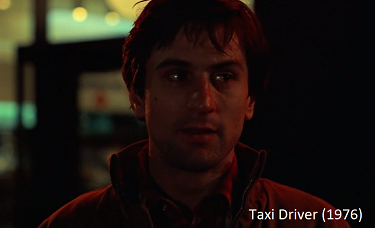
Few films throughout history, particularly those as intellectually challenging as Taxi Driver, have earned the respect and admiration they deserve. Taxi Driver, of course, is an exception. It is still enjoyed by thousands today, who either see it as an isolated character study or deeply connect with it on a personal level, seeing something of themselves in the transcendent anti-hero Travis Bickle.
The film is one of the greatest of the 1970s and of all-time, arguably Scorsese’s best in that it provides less action and a more grounded realization of American life than his other offerings. I have never found an angry review toward this film. It handles its subject matter realistically and tastefully, despite being morbid at certain points and gratuitous at others.
The film builds atmosphere excellently, in fact it is a tour de force in how to effectively unsettle an audience. This is in no small way helped by the film’s amazing score, composed by Bernard Herrmann, also known for his work with such masterpieces as The Twilight Zone, Citizen Kane, and Psycho. Here his sensibilities are jazzier, lighter, with a touch of neo-noir. being the last score he ever completed in its entirety, we see perhaps in its blaring trumpets and empty woodwinds the encroaching figure of death. This is a movie about death, after all- the death of the American dream, and the death of the psyche.
The film is not retrofuturistic, and would therefore not be considered true Rollerwave by most fans of the aesthetic, yet it is so ahead of its time- so influential to so many films that came after it- that it may as well be set in the future, and would not look out of place alongside other entries in the Rollerwave canon as we have previously defined it.
Part of the film’s appeal is that it inadvertently serves as a time capsule of an era long since dissolved. This is a film which honestly and accurately captures the spirit of the 1970s- the outfits of the city’s denizens, the smoke wafting from doorways, and particularly the bold theater marquees which openly advertise smut, made obsolete by the arrival of VHS and home video only a year after this film’s release, in 1977. This is a particular moment in time which was fleeting and impossible to maintain, an unstable point where doubt reigned over the lives of the middle class.
The film’s impact on modern Rollerwave cannot be understated. Dialogue from the date scene is sampled to great effect in Dan Frost’s composition “ScotchGARD,” the single off his famous 2017 album “To Every Man,” while the track “ 夜は続く,” which translates roughly to “The Night Continues,” incorporates pieces of the score to craft one of the best ambient songs I’ve ever heard. Listen to it yourself and you’ll hear the unmistakable noise of the slowly deteriorating mind, picked apart by months of tedium and ticking toward oblivion.
Taxi Driver will live on long after today, given that the subjects it chooses to cover are virtually timeless. There will always be Sports and Irises and Palantines in the world- and yes, especially Travises- and perhaps all we can do is sit in the back seat of the cab as it cruises silently along the dismal urban lanes and wonder who’s driving us, and where to.